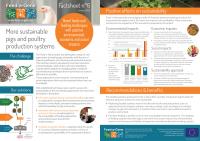Factsheet N°6 More sustainable pigs and poultry production systems
Publication date:
27 January 2020
Full title:
Factsheet N°6 More sustainable pigs and poultry production systems
Publishing information:
Feed-a-Gene, January 2020
Abstract:
 The challenge
The challenge
The Feed-a-Gene project has developed a range of new approaches to feeding pigs and poultry with the aim of improving efficiency and reducing environmental impacts. This has been done by developing novel feed resources and technologies, while at the same time identifying animals better adapted to changing global conditions, and introducing techniques that ensure feeds are used as efficiently as possible.
These approaches have economic, environmental and social implications that must be assessed before they can be adopted.
Our solutions
Well-established techniques were used to assess the sustainability of the new feeding approaches that have been developed in the project.
- Life-cycle assessment and cost-benefit analysis are used to, respectively, evaluate the environmental and economic impacts of novel feeds, precision feeding systems and selective breeding for pigs and poultry.
- Interviews with farmers and questionnaire surveys of citizens provide insights in the acceptability of feeding approaches and practical issues around their implementation.
- A simple composite indicator, weighted using the results of a survey of industry experts, provides a means of evaluating the sustainability of our proposed solutions.
Work packages:
Organisation(s):
Media category:
License: